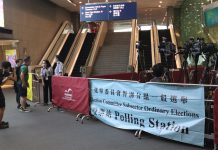Parties across the political spectrum in Hong Kong recognise the need to nurture new political talent. However, they have had varying degrees of success and enjoy vastly different resources with which to do so.
It is hard to get information or monitor the income and wealth of political parties in Hong Kong because there is no law on political donations. But pro-Beijing and pro-business parties are understood to enjoy an advantage over their pan-democratic rivals in terms of resources.
Inside a plush conference room in the comfortable headquarters of the DAB, 28-year-old Michael Lee Kwan-keung shows off his graduation certificate and tells reporters about his experiences as a student on Hong Kong’s first diploma course for politics “professionals”.
The course was launched by the DAB in 2010 and the classes offered included, Hong Kong politics, media and politics, heritage and cultural policy and the politics and history of the DAB.
Although he had always been interested in politics, Lee, a business information technology professional, says he was not a DAB supporter before the course. After getting his diploma in a graduation ceremony attended by Financial Secretary John Tsang Chun-wah, Lee joined the DAB and became a branch committee member in Island South.
Lee says he has no immediate plans to run for office, but should he want to, he can count on comprehensive support from his party.
Like many other parties, the DAB has a youth section, Young DAB. It also has a training committee to nurture politicians in the party. Fung Pui-cheung, the chairman of the training committee, is responsible for the curriculum design and coordination of the diploma course.
Fung says the course is aimed not just at DAB members, but also outsiders in a bid to recruit new talent and attract more gifted people to get involved in politics. The first course was so successful – more than 100 people, mainly in their 20s and 30s, applied for 30 places – that a second one is being offered this year.
Ten graduates from the first course joined the DAB and Fung says the party will continue to offer them training, which would be tailor-made, based on their needs. Some of this training takes place on the mainland at central-government run institutions like the China Executive Leadership Academy Pudong and Chinese Academy of Governance.
Apart from training, the DAB can provide rookie politicians with social networks, human resources and other support. If a DAB candidate loses in a district council election he can apply for a job at one of the party’s 18 branch offices or work as an assistant to a councillor and wait to fight again in another four years.






































